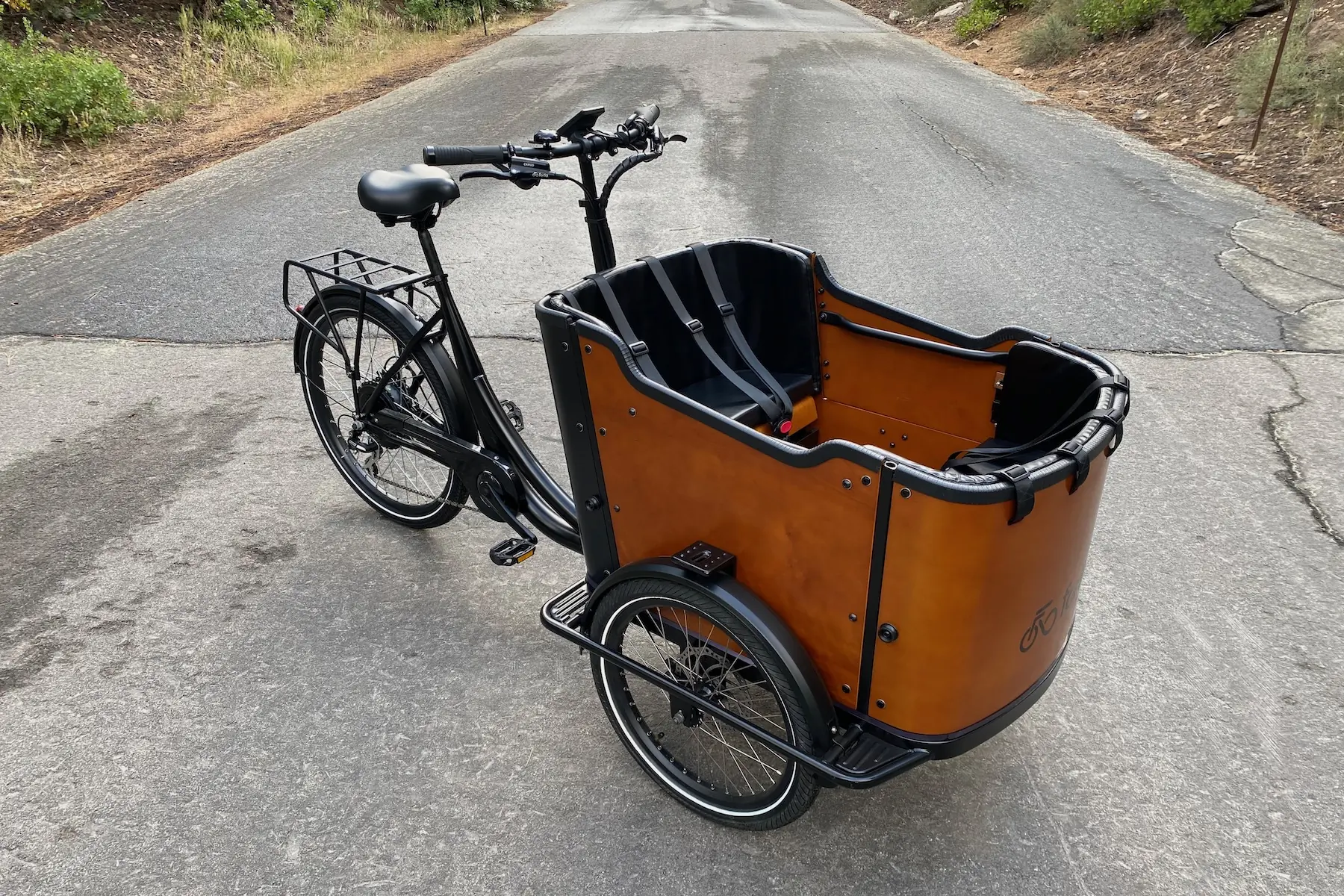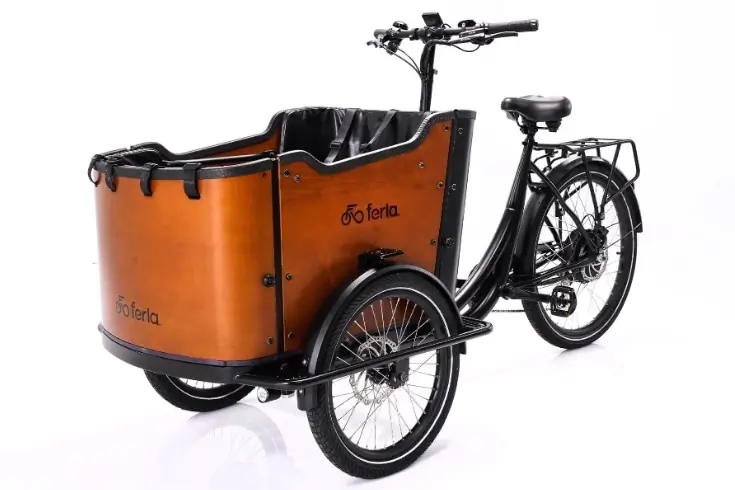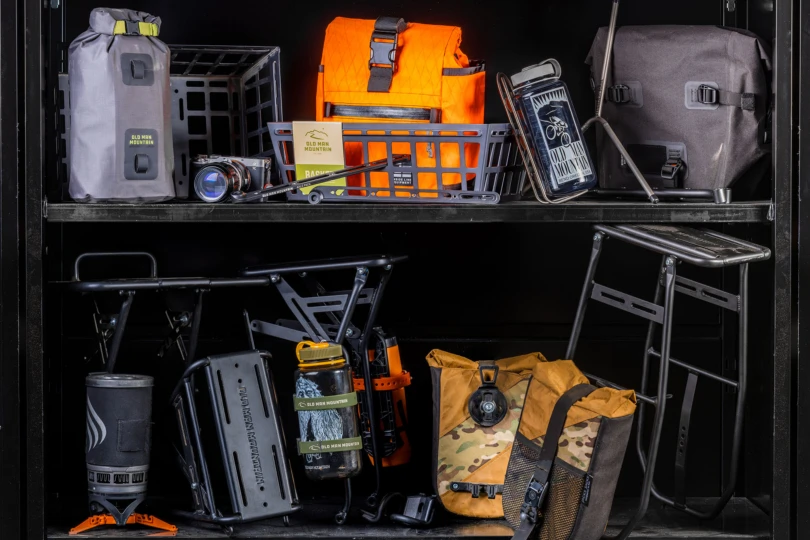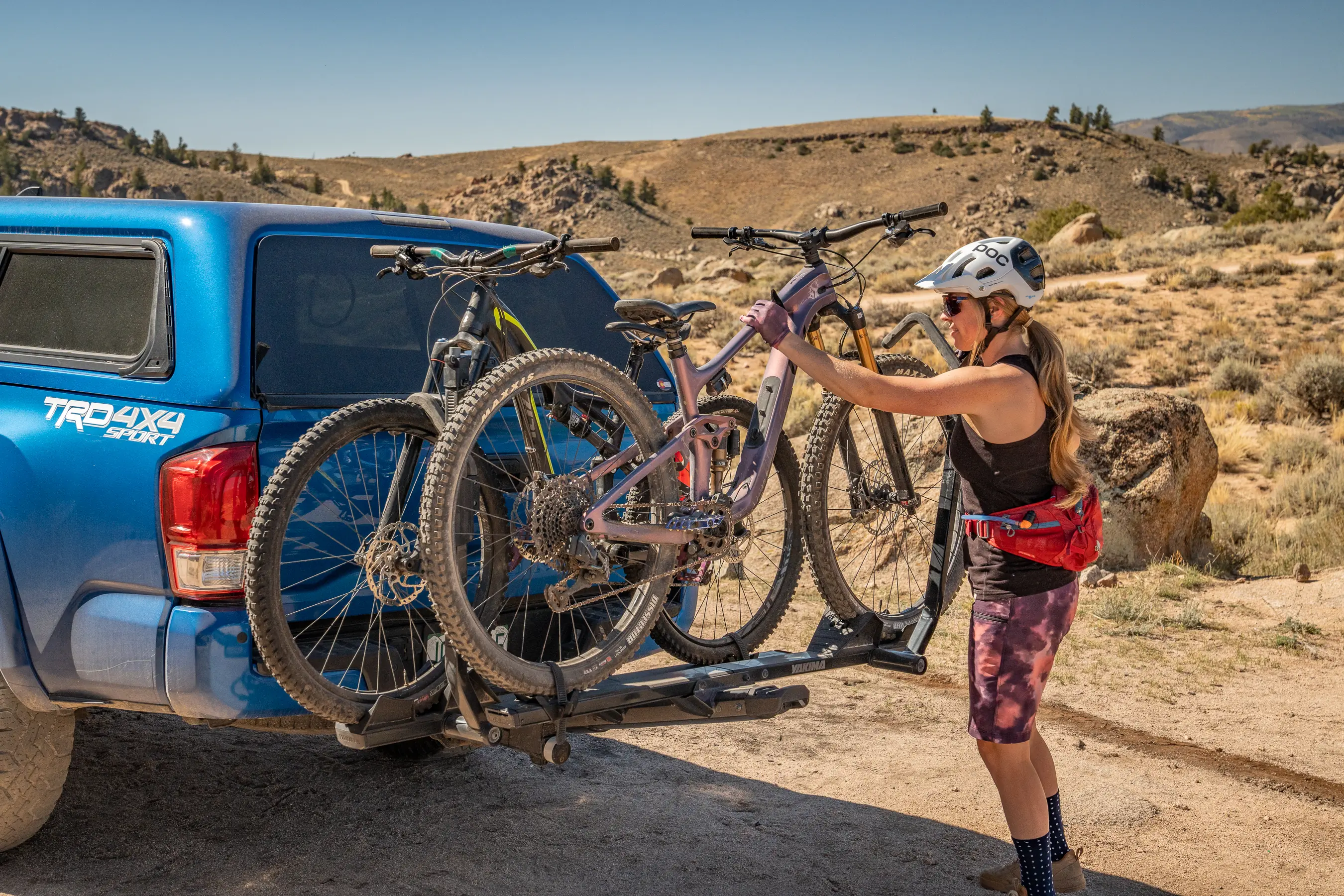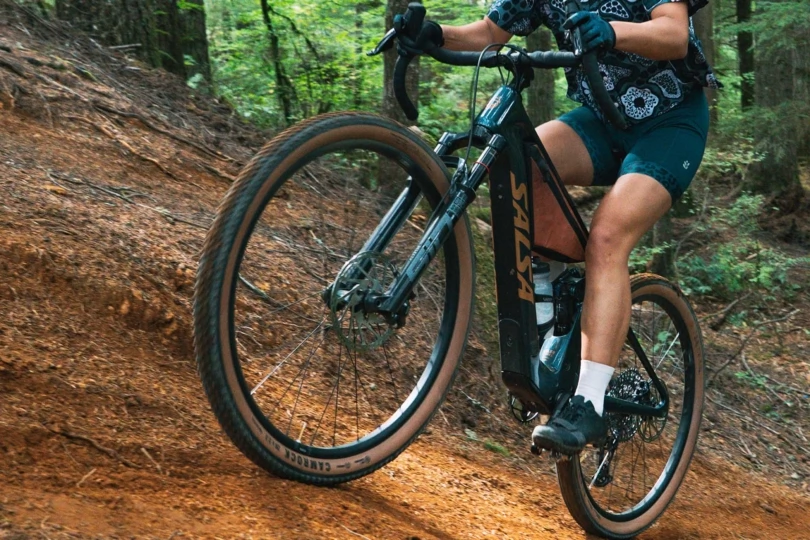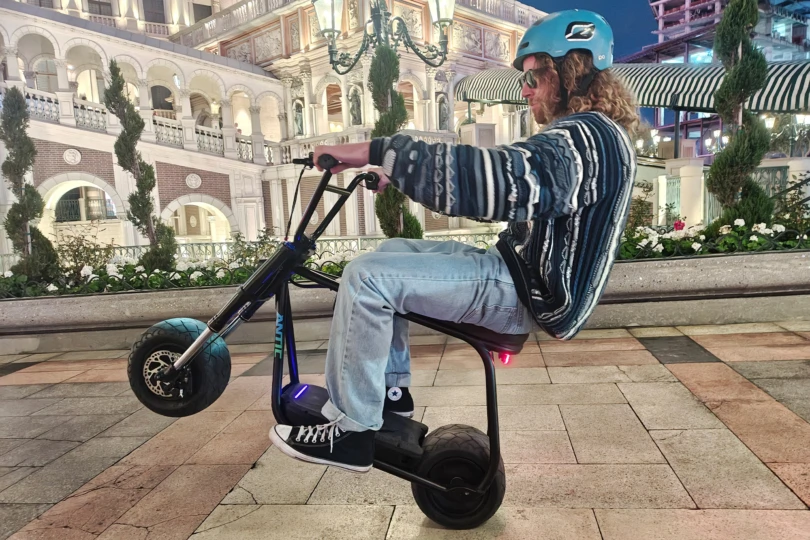Family-friendly front-box cargo bikes are a common sight in Europe, but they are gaining popularity in North America — specifically the U.S. Several brands are producing these three-wheeled kid and cargo haulers, including Ferla Family Bikes. The Ferla Royce 2 is one of the brand’s latest models and is made to carry up to four small passengers — up to 450 pounds of cargo — in comfort and style.
I recently had the chance to test the new Ferla Royce 2 ($5,499) for a week and was very impressed by its design and performance. Ferla clearly put a lot of time and effort into making sure that every last detail was taken care of to ensure the comfort, safety, and enjoyment of the passengers and rider.
This includes quality components, powerful brakes, and a robust 750 rear hub motor that is actually up to the task of transporting the loads it was designed for. It also includes a wealth of available options and accessories like padded seat cushions, canopies, non-slip floor mats, and even fun LED lights.
In short: If you’re seeking a vehicle alternative to transport your kids or or other cargo, the Ferla Royce 2 is the best front-box model that I’ve ever tried. The front cargo box puts your passengers where you can see them for a fun and engaging experience, and every aspect of this bike is well-considered. The caveats are that the three-wheeled handling does take some getting used to, it requires a significant amount of storage space, and it is pretty expensive. But if you can afford it, the Royce 2 is a fun and easy way to transport the whole family.
-
Ride Quality
7.0
-
Power & Range
7.0
-
Capacity
8.0
-
Accessories
7.0
- Class: 2
- Motor: 750W Bafang rear hub
- Battery size: 840 Wh
- Wheel x Tire size: Rear: 26” x 2.0", Front: 20" x 2.0"
- Weight: 158 lbs.
- Length: 85.5”
- Carry capacity: Rider: 250 lbs., cargo: 450 lbs., total: 700 lbs.
- Range (claimed): Single battery: “45+ miles”, Dual battery: “90+ miles”
Pros
- Powerful motor
- Impeccable finish and attention to detail
- 700-pound total weight capacity
- Loads of add-on options to dial it in for passenger comfort
- Well-considered components – powerful brakes
- Great controls and display
Cons
- Handling takes some getting used to, but better with weight in cargo area
- Battery charging port is in an inconvenient location
- Takes up significant storage space
- Expensive
Ferla Royce 2 Review
Ferla Family Bikes has been around since 2016 and has a growing product range that consists mostly of electric cargo models. A quick glance at the Ferla website reveals that front box models are its specialty. This three-wheeled style of cargo hauler is slowly but surely gaining popularity and becoming a more common sight in the U.S., but is still dwarfed in number by long-tail models.
I’ve tested quite a few electric cargo bikes over the years, but only one other front box model, the Bunch Original. It depends on your specific needs and preferences, but they are arguably a better choice for many users. So, when Ferla reached out and offered to let me test its latest model, the Royce 2, I was happy to see what the brand had to offer and how it performed compared to other bikes I’ve ridden.
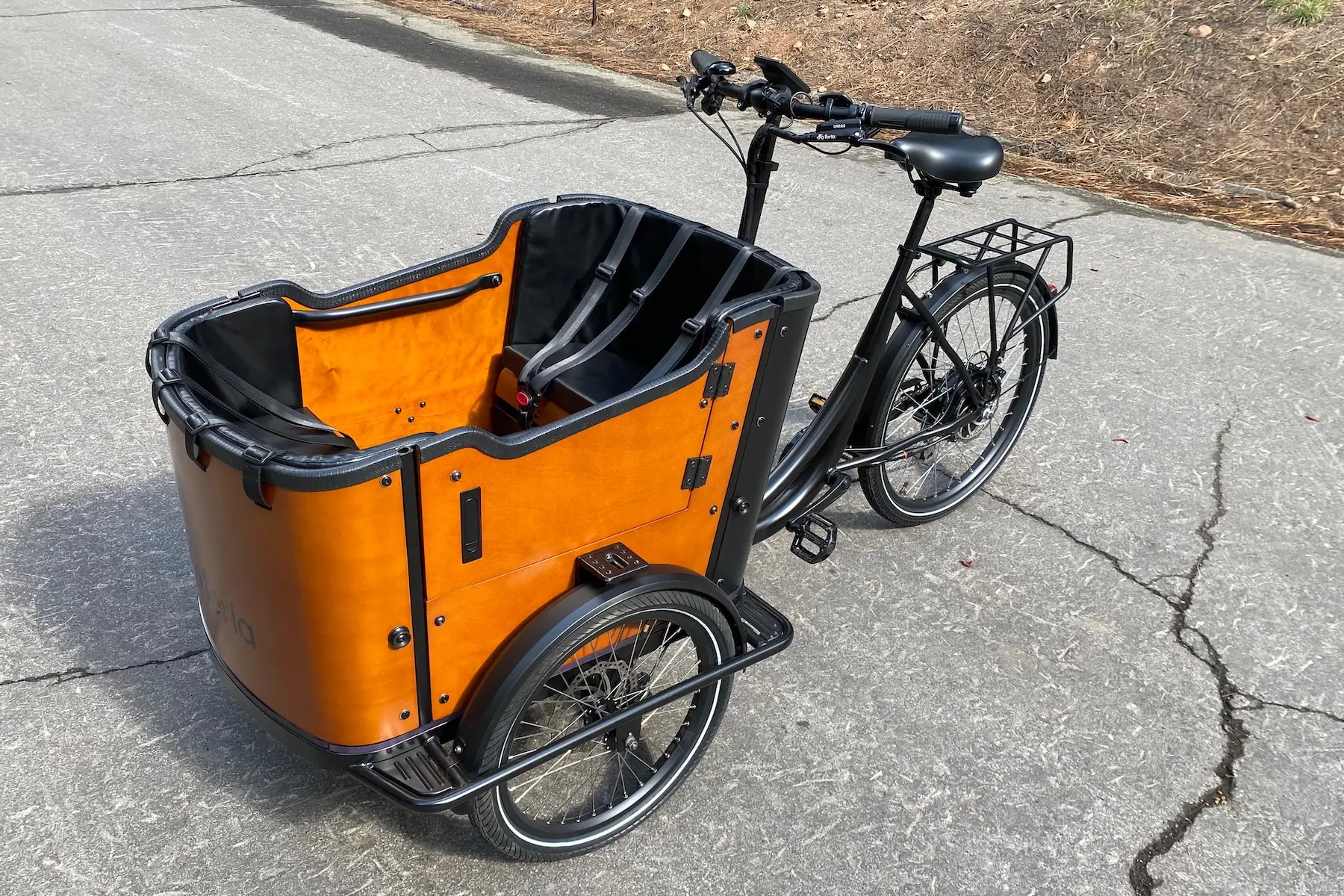
Ferla Royce 2 Design
Ferla Family Bikes is pretty clear about the target audience of the Royce 2 — and all of its bikes, for that matter — families. This family-first approach is very evident in the design of the Royce 2, with a large front cargo compartment that’s intended to fit up to four small passengers or a total of 450 pounds of cargo.
This type of front box necessitates the three-wheeled design with two wheels in front on either side of the cargo box and one in the rear. The trike design of this and similar bikes has inherent benefits and drawbacks, which I’ll cover in more detail below.
The weight of the cargo box is supported in the front over the front axle that spans between the two 20-inch diameter wheels. The smaller wheel size allows the bottom of the cargo box and, therefore, the center of gravity to be nice and low for stability.
The wheels are fixed in position on the sides of the cargo box, which turns on a steering axis centered beneath it. The handlebar is attached to the back of the cargo box, and unlike two-wheeled bikes where you twist the handlebar to change direction, you instead push the handlebar — and the whole front box— out to the sides to steer.
The stout steel frame extends back from underneath the cargo box and curves up to form the seat tube and join with the rear triangle. This design allows for a very low stand-over and step-over height, which makes getting on and off the bike incredibly easy. In contrast to the small wheels at the front, the rear wheel is 26 inches in diameter. Above the rear wheel is a sturdy steel cargo rack.
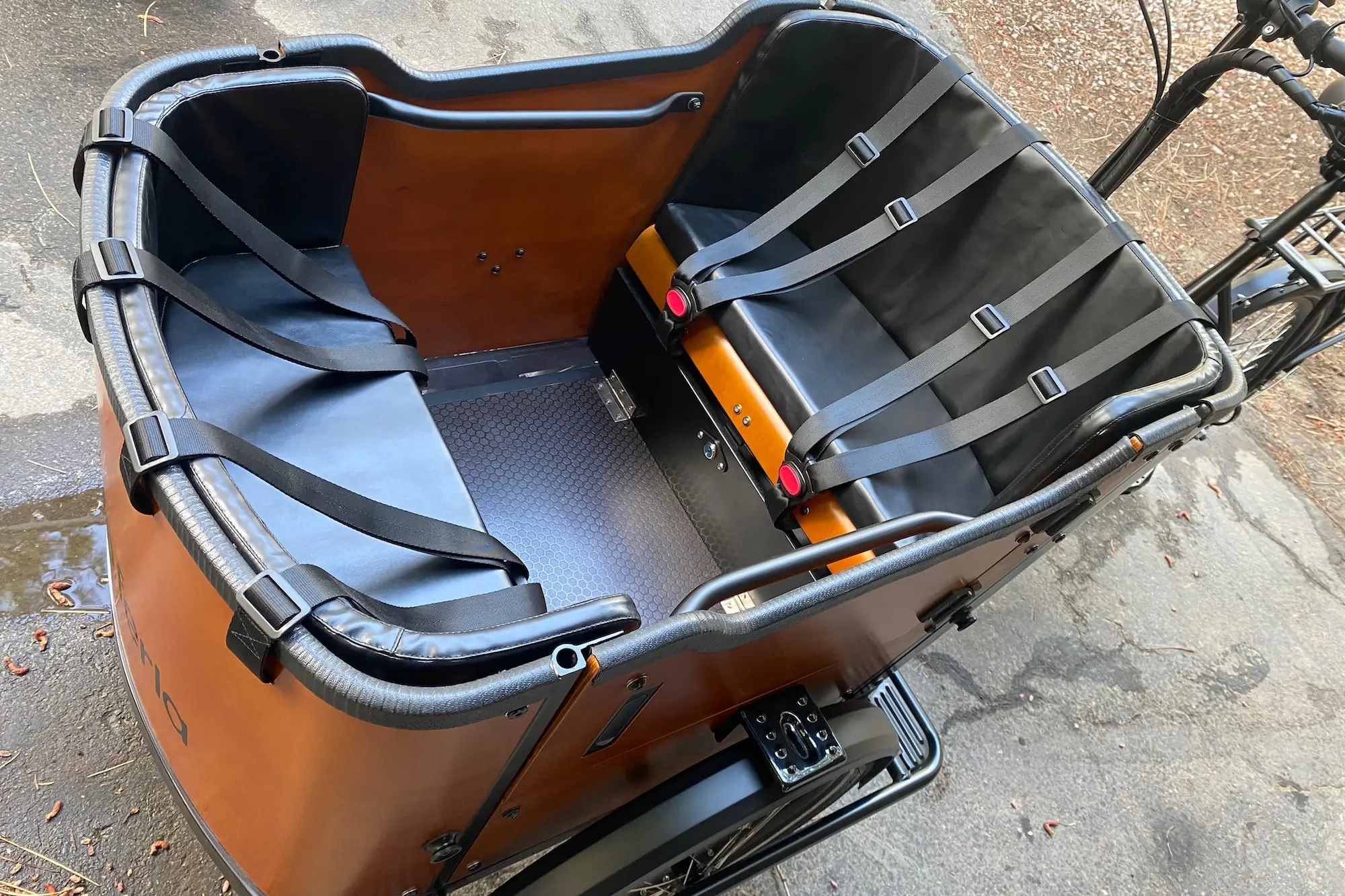



Cargo Carrying
As mentioned above, the Ferla claims the Royce 2 can carry up to 450 pounds of cargo along with a 250-pound rider for an impressive 700 pounds total. That’s significantly more than most long-tail bikes, which top out at around 400-450 pounds total. Unlike long-tail cargo bikes, where child passengers sit behind the rider, they ride up front in the cargo box.
This allows them to see where they’re going, sit side by side, interact with each other, and interact with the rider. The size of the front box also makes it really easy to transport bulky items like large boxes that may otherwise be difficult to load on a long-tail cargo bike.
At the base price of $5,499, the Royce 2 comes ready to transport up to four small children. The large front box has dimensions of 39.5” long x 25” wide x 21” tall, and it comes with two small benches for seats as well as four three-point harnesses to secure small passengers. The three-point harnesses are easy to operate, and they can be removed depending on your needs.
The box itself is made with “ultra-premium bamboo composite,” which has a classy look in the wood finish I tested. It also comes in matte white, matte black, and pink, if you prefer.
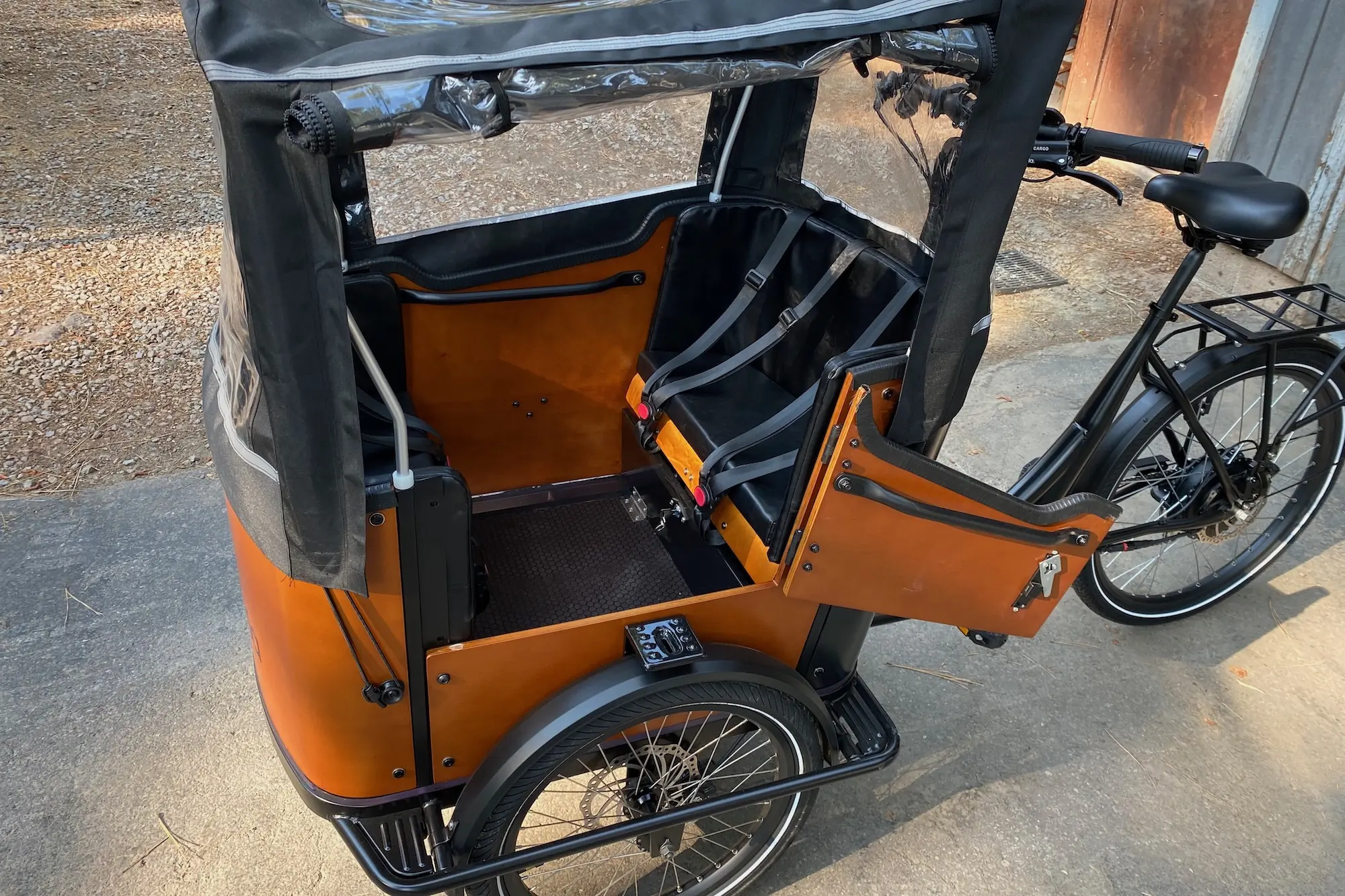



The top edge of the cargo box is padded to avoid any sharp edges that could be potentially dangerous to passengers, and a two-step design makes getting in and out of the box relatively straightforward. Handrails on both sides of the cargo box are there for kids to hang onto while riding or for safety when climbing in and out of the box.
My test bike came decked out with all the bells and whistles, all of which can be added on when buying to get it set up for your preferences or needs. These features include a side door on the cargo box for easier entry and exit ($300), eco-leather memory foam seat cushions ($200), a water- and dustproof floor mat ($100), lockable storage compartments ($150), a bimini top ($100), a fully enclosed sun and rain canopy ($175), a clear floor with LED lights ($299), and a cargo box table ($150).
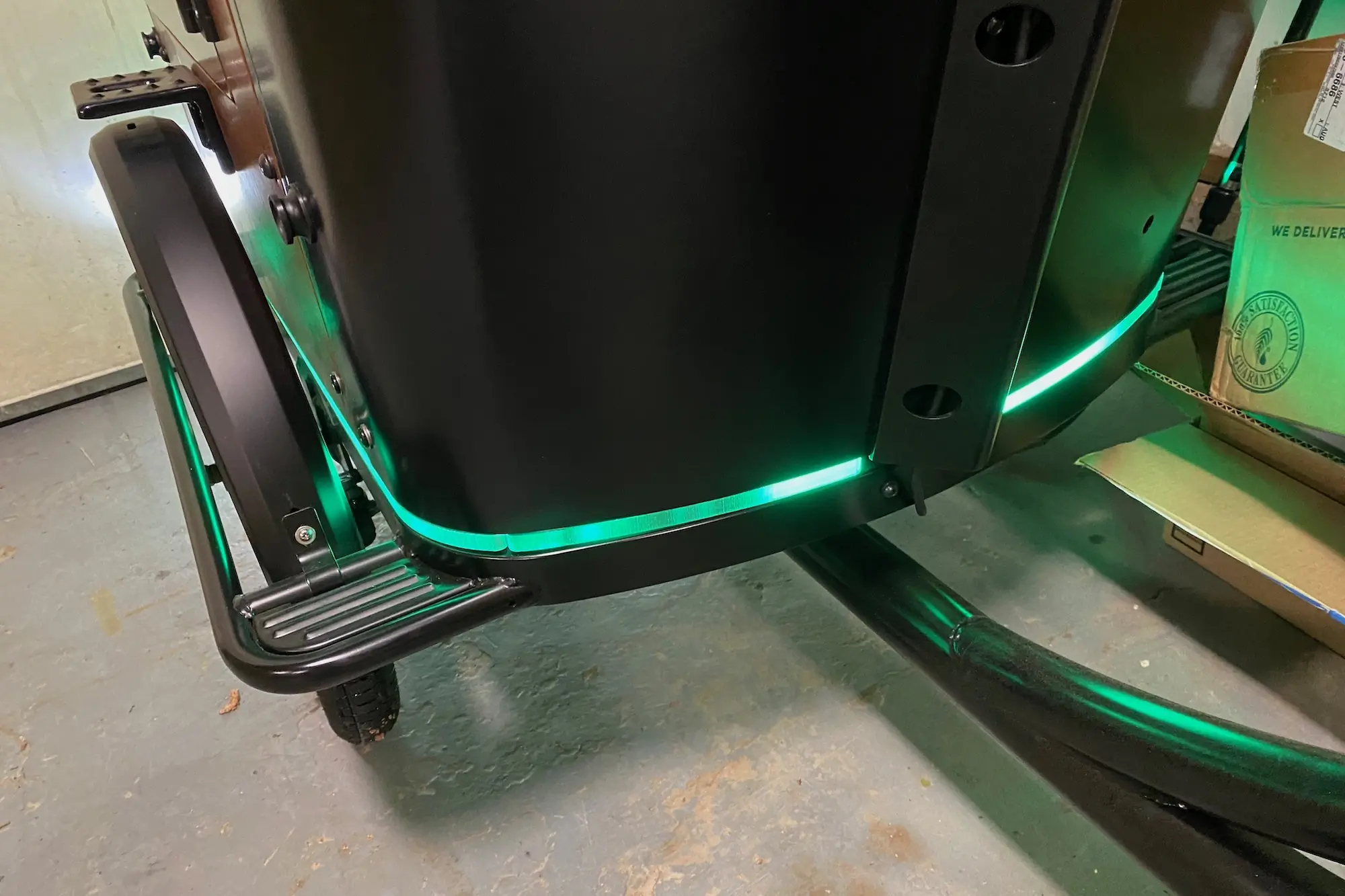



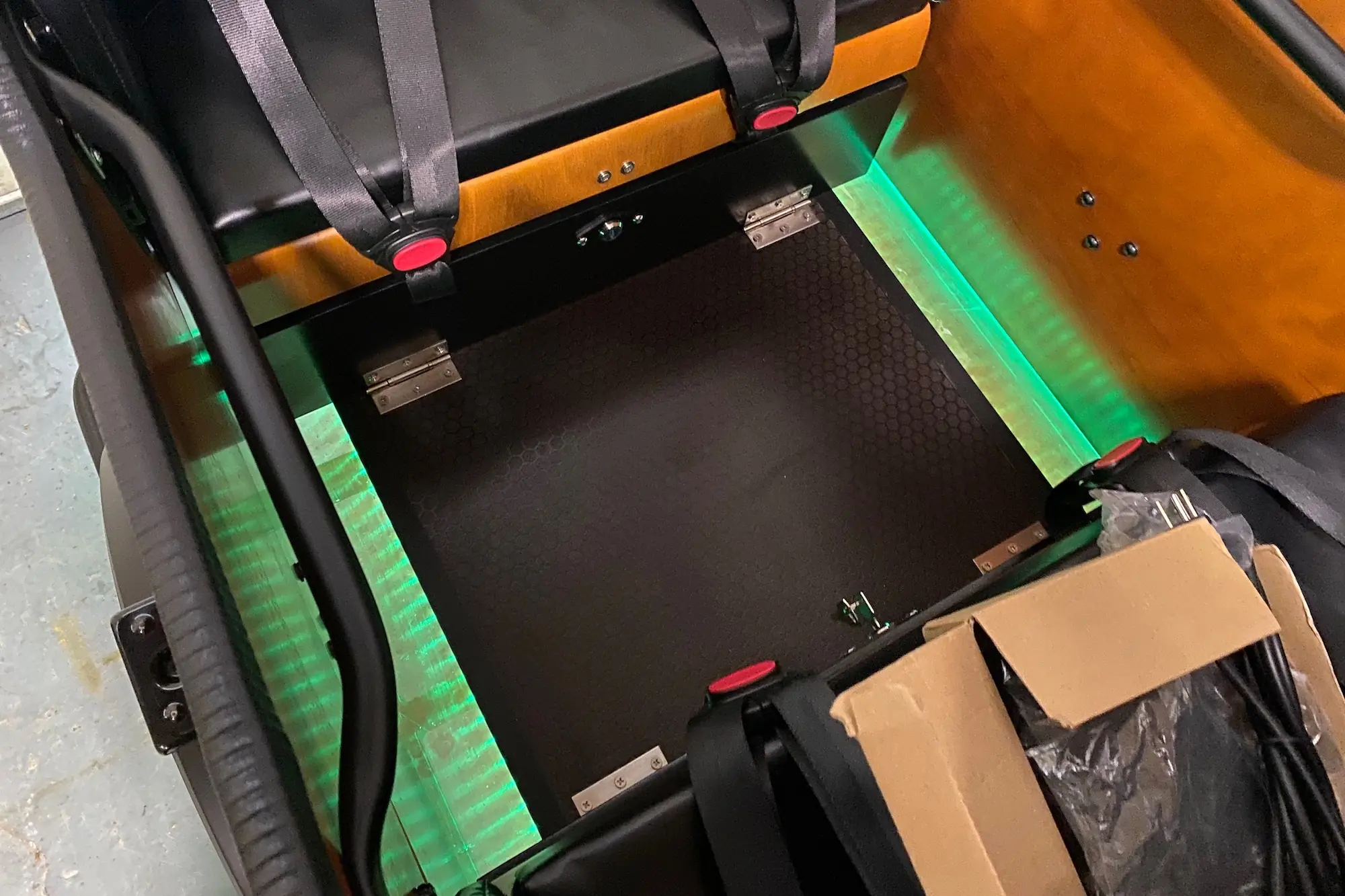



Each of these add-ons can add significant comfort, convenience, and enjoyment for both the passengers and the rider. All of the accessories I tried create a pretty luxurious experience and ensure child comfort. The Clear floor with LED lights was probably my favorite, with a ring of LED lights around the bottom of the cargo box that adds visibility from the outside and glows from underneath.
You can change the color of the lights with the included remote to light up your bike like you’re riding across the playa at night at Burning Man. That said, the accessories can add up quickly. If you were to purchase all of the options and accessories I mentioned above, it would add roughly $1,500 to the already significant price of the Royce 2.
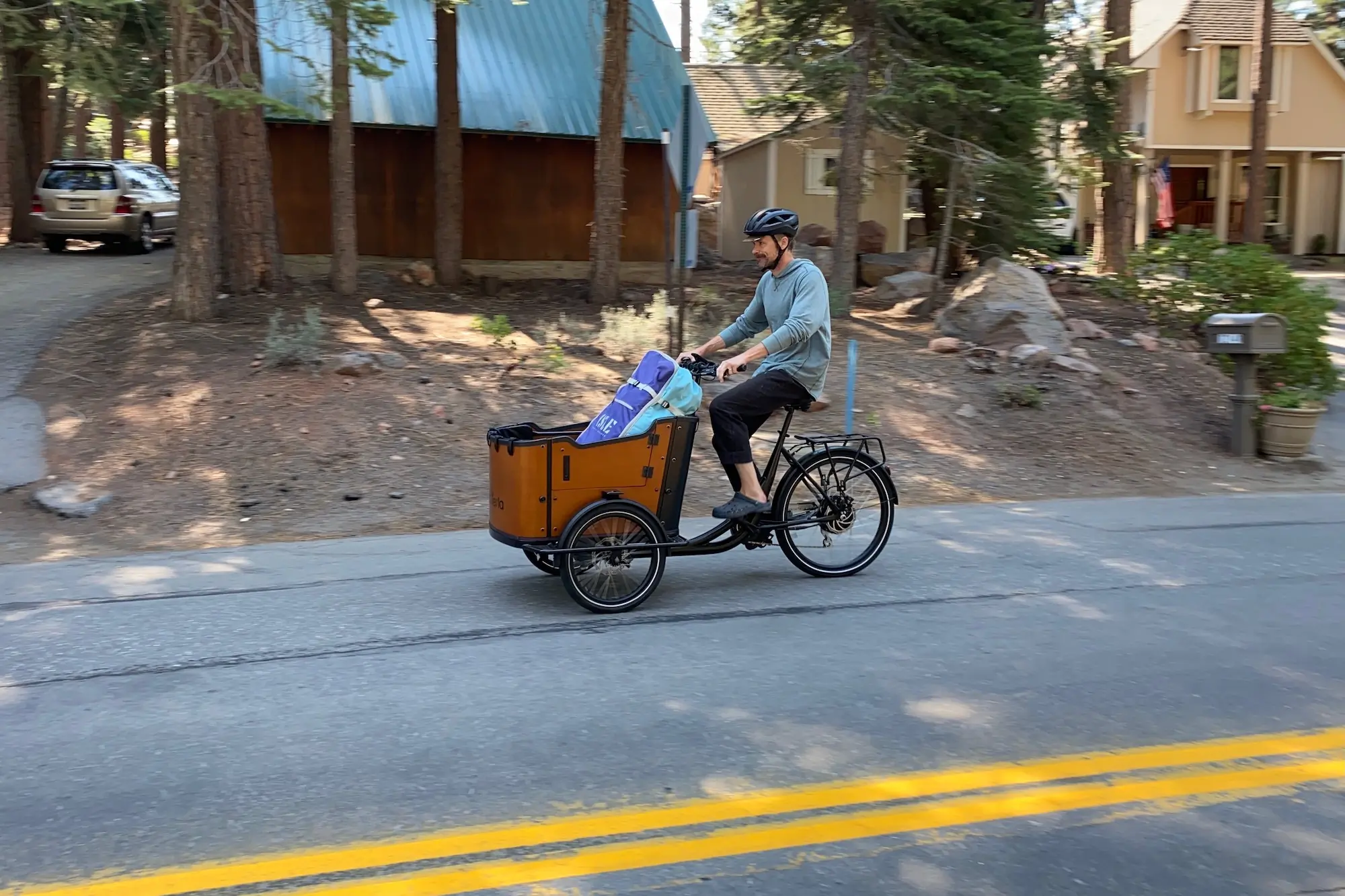



Fit and Comfort
Ferla lists a 250-pound rider weight limit and recommended user height range of 4’11” to 6’5” for the Royce 2. That means there is a large range of adjustability to suit riders of varying sizes, which should work for the majority of potential users. I can’t confirm if that suggested height range is accurate, but I’m 6 feet tall and often max out the saddle height of many electric bikes claimed to fit users taller than me.
I was comfortably in the middle of the seat height adjustment, so I assume it should definitely work for riders a few inches taller and shorter than myself. Whether or not it can actually fit someone 13 inches shorter than me is debatable, but doesn’t seem impossible, either.
The handlebar is fairly close to the rider, and the seated pedaling position is pretty upright and casual. Depending on your height and preferences, the handlebar height is also adjustable to dial it in to your needs. I had no complaints about either the seat or the grips, both of which proved to be plenty comfortable.
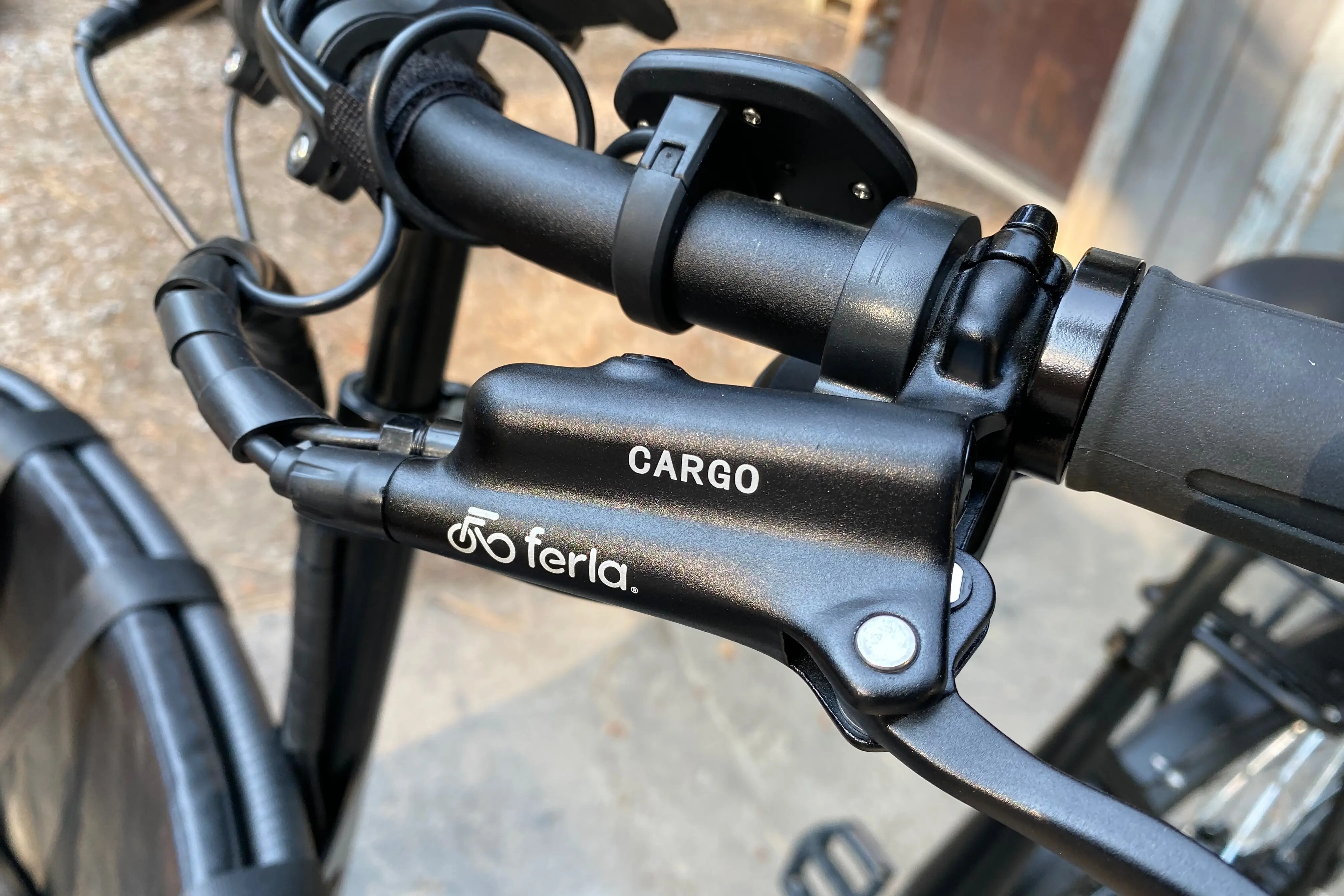



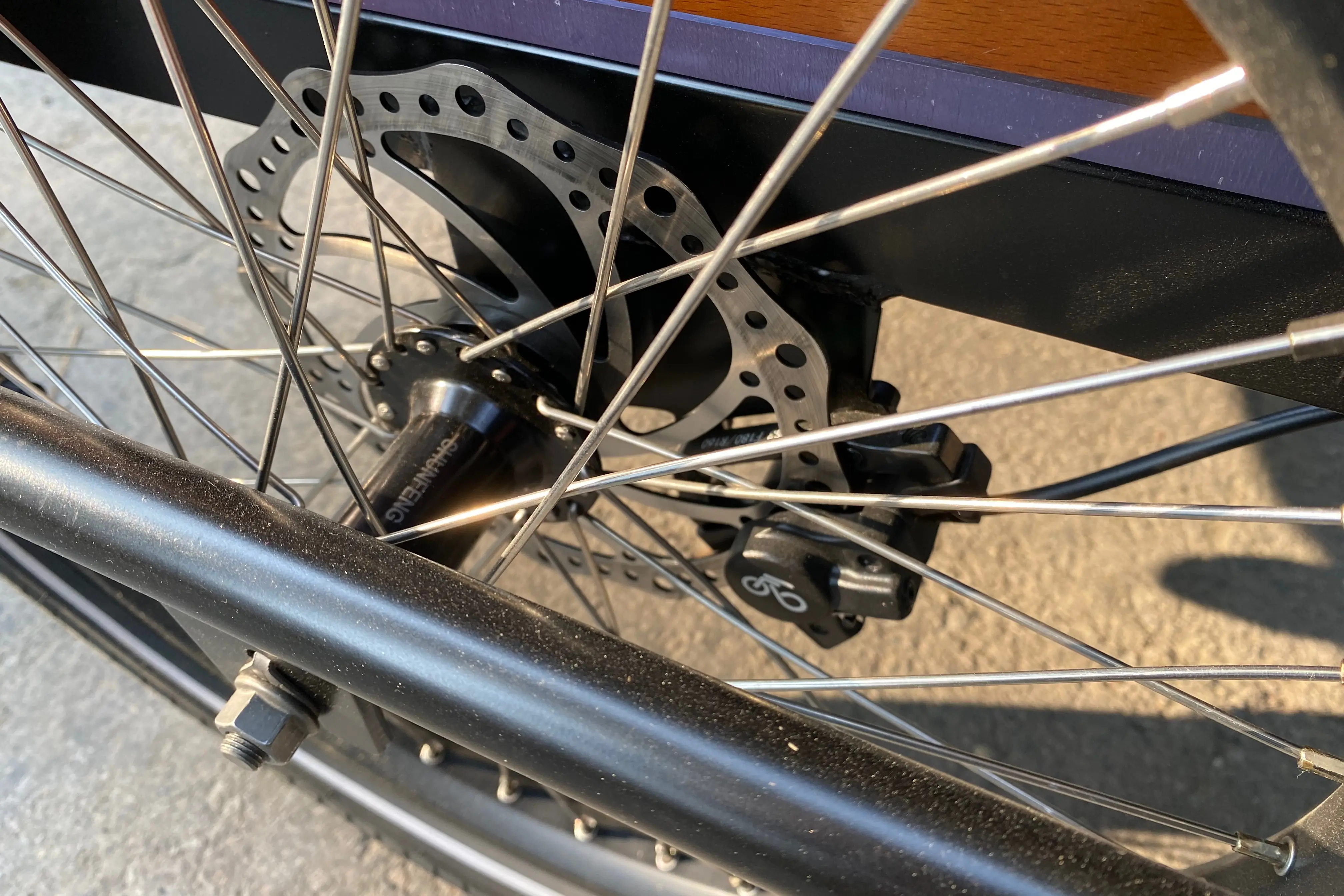



Components
With a starting price tag of $5,499, one would expect the Royce 2 to come with good components, and thankfully, it does. For control and safety, one of the most important parts of the build is the brakes. This bike is big and heavy on its own, and when loaded with cargo, it needs some serious stopping power. The powerful hydraulic disc brakes on all three wheels work very well and have a parking brake feature to ensure it doesn’t roll away on uneven surfaces.
The Shimano Acera eight-speed drivetrain provides a large gear range, and the trigger-style shifters work great. You’ll want to avoid riding this bike without power at all costs, but even with power, it’s nice to have the gearing to tackle hills and haul cargo.
All three wheels come with 2-inch-wide puncture-resistant Kenda tires with a reflective stripe for added visibility. These tires roll nice and smooth, and the 2-inch width provides a little extra girth and cushioning over small cracks in the pavement. The touch points are also well sorted with durable alloy platform pedals, a comfortable seat, and ergonomic grips.
Full-coverage fenders front and rear protect the rider, passengers, and bike from road spray should you get caught in a passing shower. A light on the rear fender adds visibility from behind, while two front lights mounted beneath the cargo box provide visibility from the front and are powerful enough to light your way in the dark if needed. All of the lights run off the bike’s battery, so you’ll never have to remember to charge them independently.
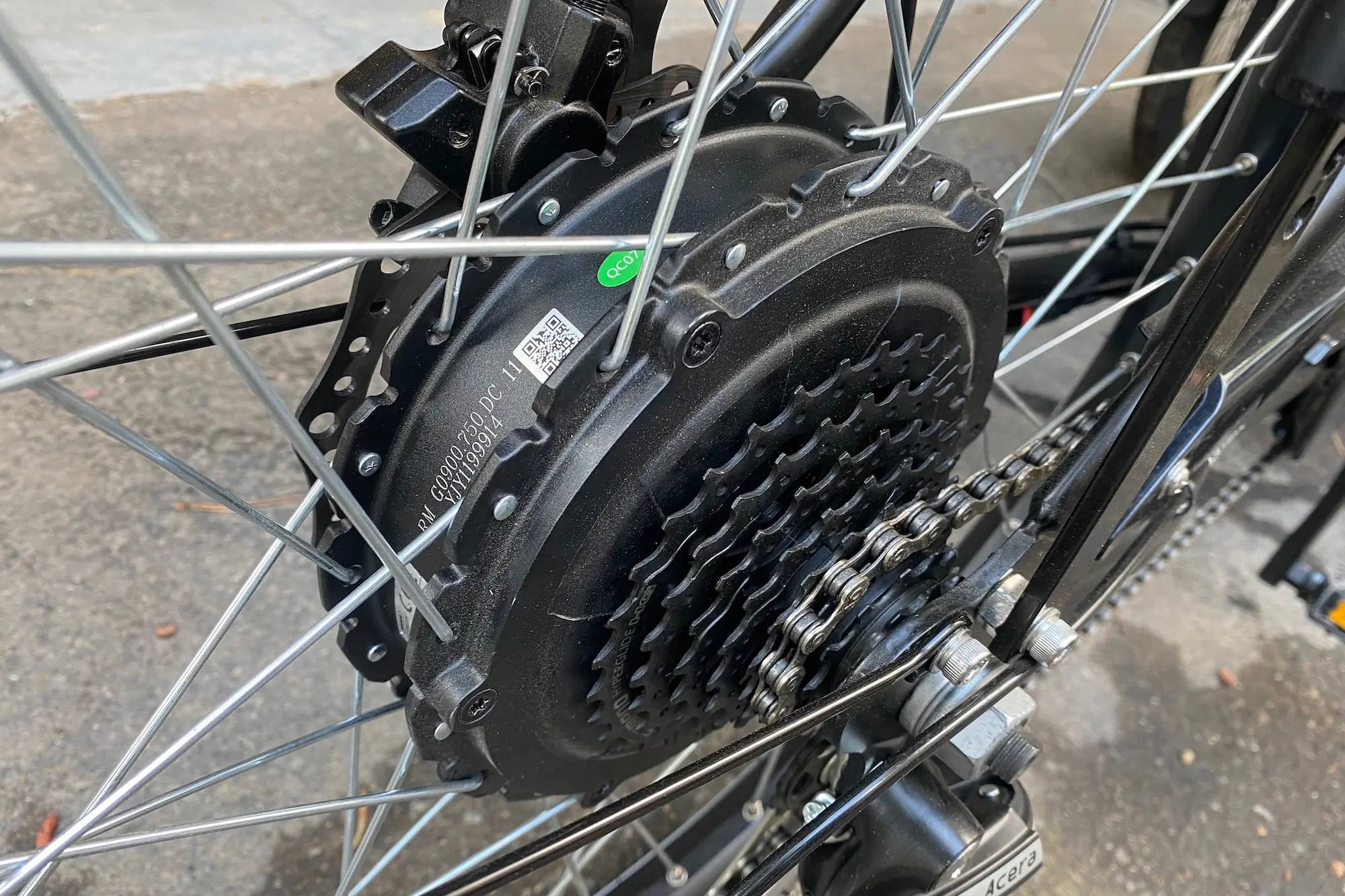



Motor and Power
The Royce 2 comes with a 750W UL Certified Bafang rear hub motor that is the most powerful that I’ve seen on a bike of this style. Of course, ripping around at its top pedal-assisted and throttle speed of 20 mph isn’t exactly the goal on this bike, but having that power on tap when you’ve got a heavy load, or you’re riding up hills, or both is definitely pretty nice — especially compared to similar bikes with less powerful motors.
The five levels of pedal assistance are changed through the handlebar-mounted control unit, which is intuitive and easy to reach with the left thumb while riding. Each level provides progressively more assistance and a slightly higher top speed, topping out at 20 mph in level 5 — which is a little faster than I found to be comfortable.
Likewise, the thumb paddle throttle is located on the left side of the handlebar, and it can be used to propel the bike forward under full electric power with the amount of power delivered corresponding to the chosen assist level. With a heavy bike like this, having a throttle is incredibly helpful to get going from a complete stop, especially when you’ve got a heavy load.
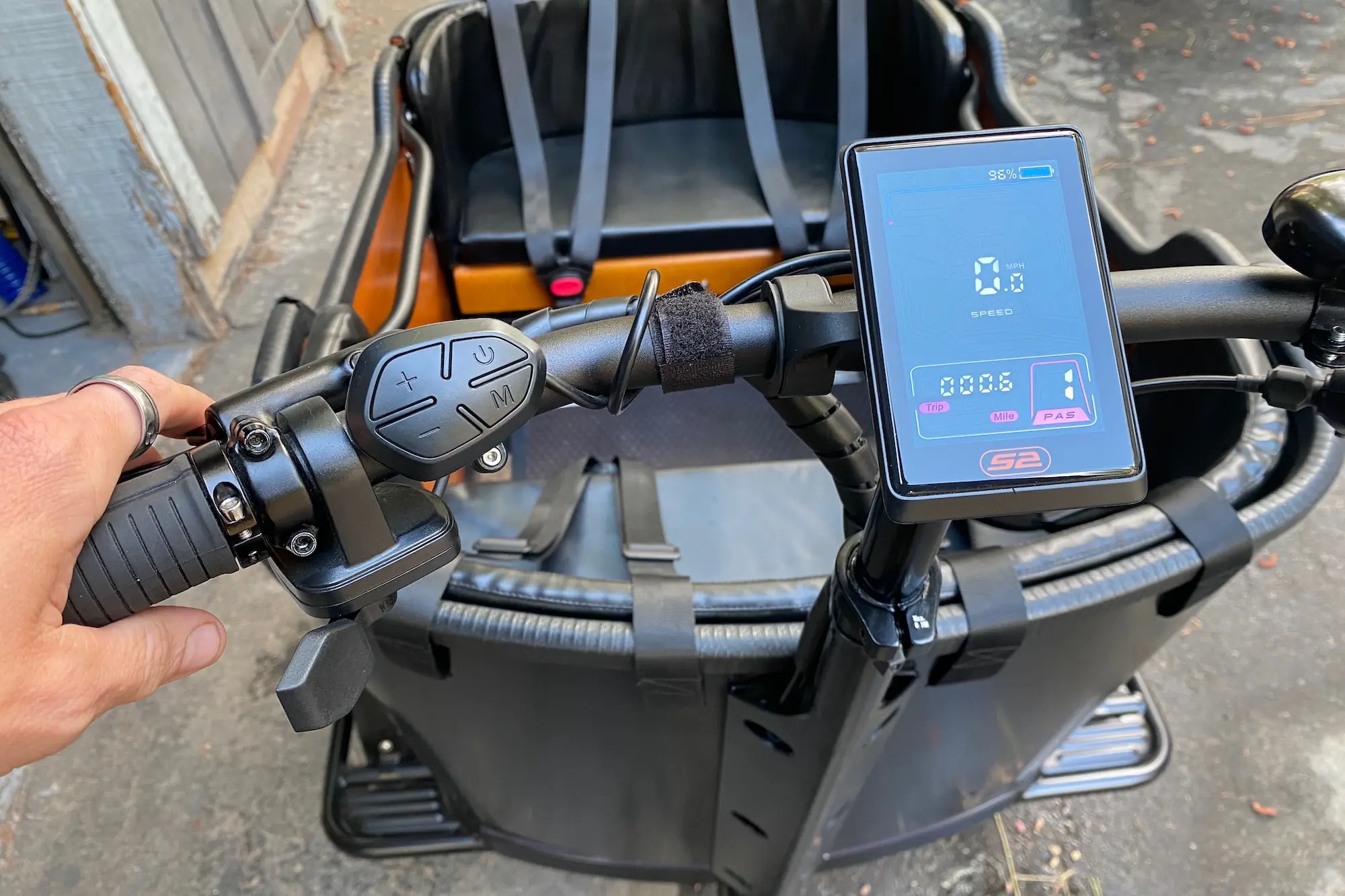



Like most modern electric bikes, the Royce 2 has a large digital display centered on the handlebar, where it’s easy to see while riding. The LCD color display has a black background and several data fields that show all of your pertinent ride info at a glance, such as current speed, remaining battery life, pedal assist setting, and distance.
Through the controls, you can also enter the menu to adjust the bike’s settings through the display. A USB port is also included should you need to charge any electronics on the go.
The Royce 2 that I tested came in the single battery configuration with one UL-certified 840Wh (48V, 17.5Ah) battery. That’s a pretty sizeable battery, which is nice considering the weight of the bike, the 750W motor, and the potential for carrying heavy loads — all of which add up to using more power.
With the single battery, Ferla claims a range of up to 45 miles, which may be possible in ideal conditions, but I’d expect roughly half of that in normal everyday riding situations. Of course, many factors play a role in how far you can ride on a single charge, like rider weight, cargo weight, power output, throttle usage, terrain, etc.
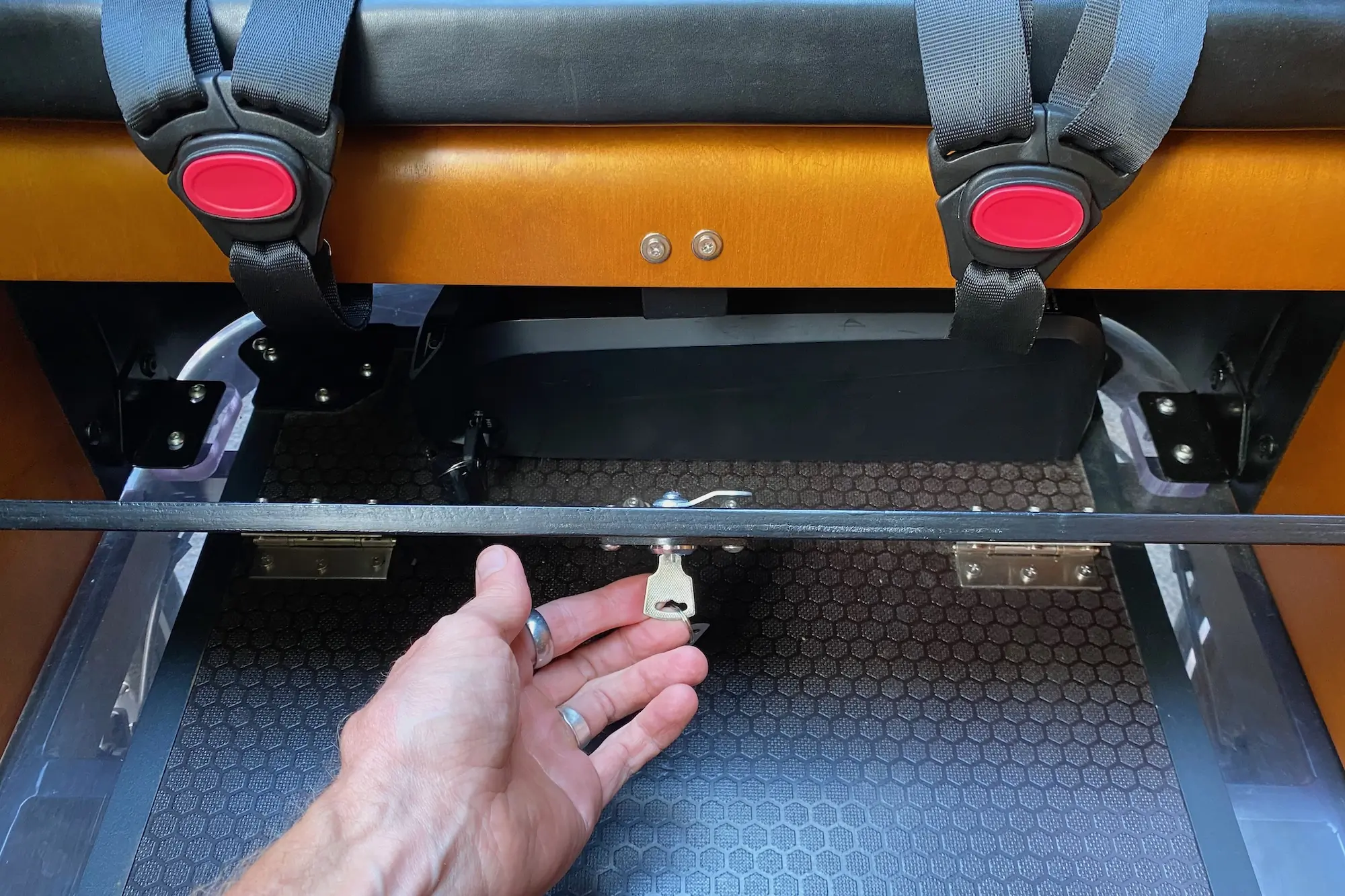



The battery on my test bike was housed in the cargo box under the bench closest to the rider. This spot keeps the weight low on the bike and hides it away from view, but it also puts the charging port in a very inconvenient location.
I found I needed to remove the battery to access the charging port, which is not ideal. Ferla also gives the option to upgrade to a dual-battery system for a $799 upcharge, which effectively doubles the range. If you’re planning to ride longer distances, the dual battery may be a worthwhile investment.
The Ride
This wasn’t my first time riding a three-wheeled front-box cargo bike, so I came in with prior knowledge of how a bike like this handles. In the context of three-wheeled bikes, the Royce 2 handles very well, but I think it’s important to note that it is quite different from riding a two-wheeled bike. The design has inherent advantages and disadvantages, which I’ll explain below.
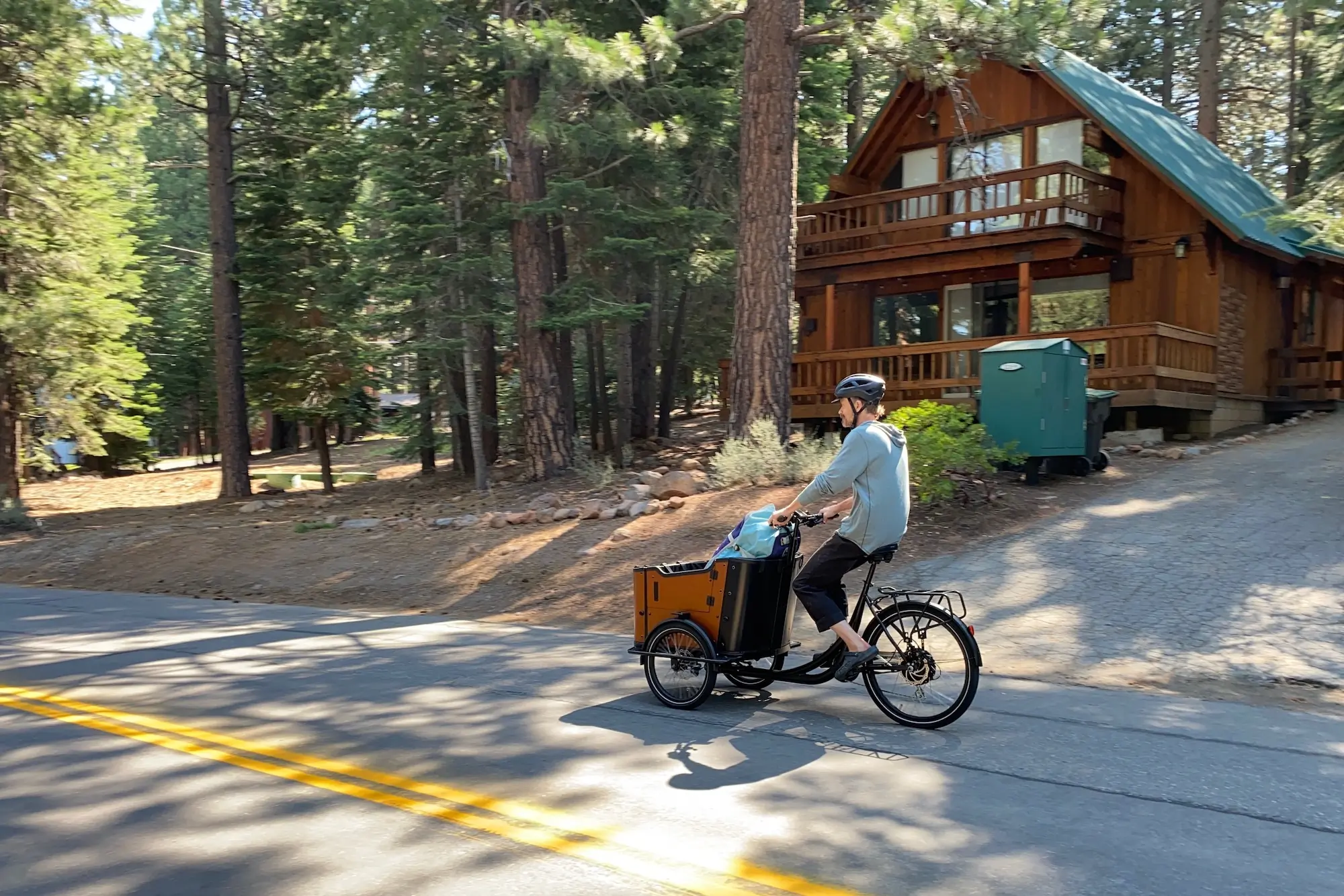



In some ways, the three-wheeled design is more stable. With three points of contact with the ground, the Royce 2 stands up on its own when stopped and doesn’t require a kickstand.
Engaging the parking brake feature of the brakes keeps it from going anywhere, and the inherent stability of the bike makes it easy to load and unload passengers or other cargo without needing to stabilize the bike or worry about it tipping over — as is often the case with long-tail cargo bikes.
Similarly, it doesn’t require as much balance on the part of the rider while moving, and the weight of the cargo is also low between the two front wheels. Squirming children on the back of a long-tail bike can dramatically impact its balance, but it has much less of an impact on the front box. In fact, front-box cargo bikes actually feel much more stable while riding with weight in the front than without.
In other ways, the three-wheeled design can feel a bit less stable. This presents primarily when turning or riding on off-camber or uneven surfaces. Since you are unable to lean the bike and the front wheels are connected on a solid axle, steering a bike like this is a bit different and requires a little getting used to. This is pretty apparent the moment you ride a three-wheeled bike for the first time, and you quickly realize you have to slow way down when turning.
Likewise, going from a flat surface to one with pitch — like pulling into a sloped driveway — can feel somewhat awkward and unstable if you hit the transition at an angle. Changes in slope are best approached straight-on and at conservative speeds.
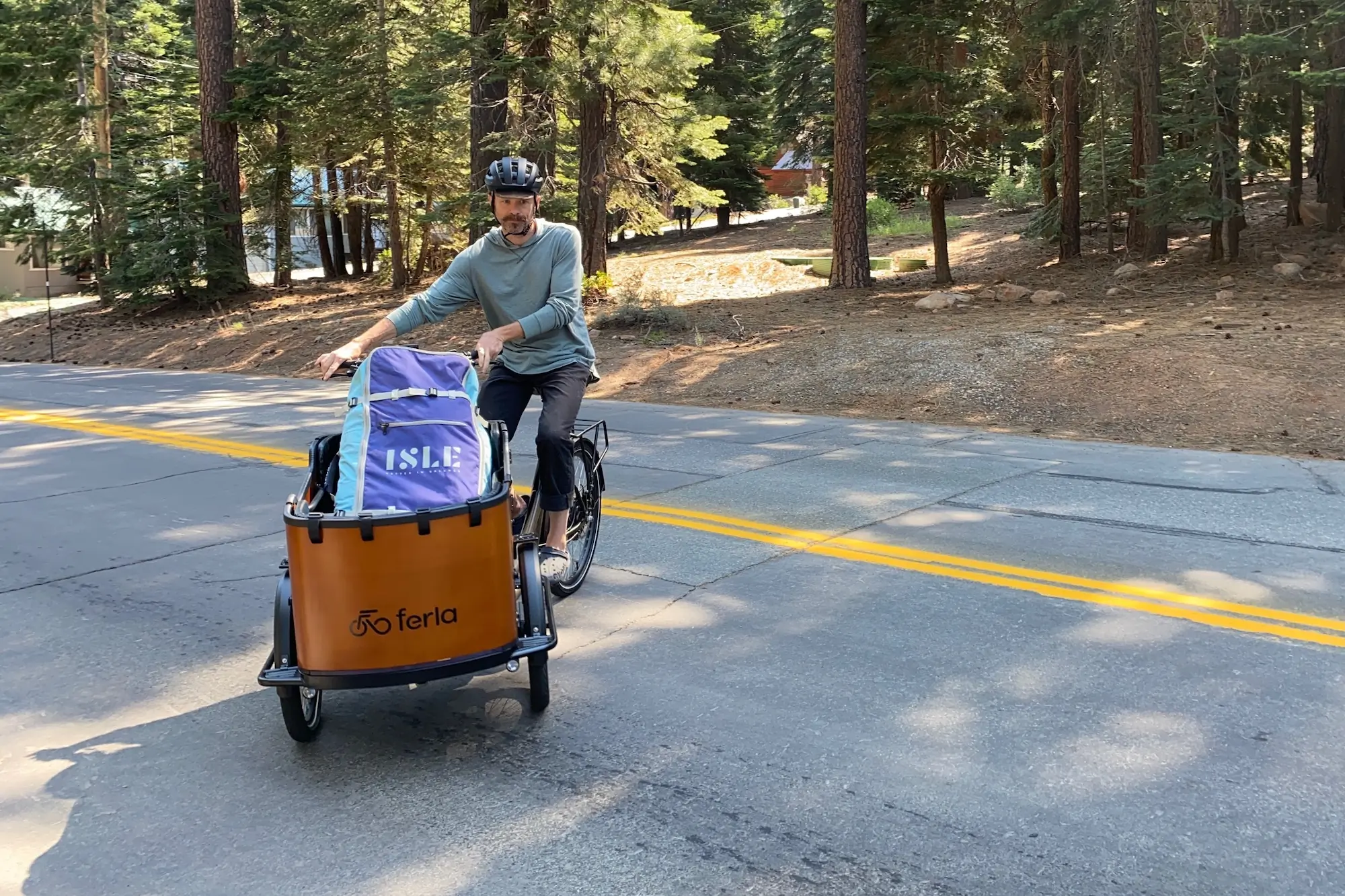



The simple act of steering the bike is also quite different. Unlike the familiar motion of twisting a handlebar to turn the front wheel, three-wheeled bikes require that you push the whole handlebar out away from you. This is due to the fact that the steering axis is centered between the two front wheels under the cargo box as opposed to the handlebar/stem. You get used to it pretty quickly, but it feels a bit foreign at first.
On top of that, the Royce 2 — and similar bikes — has a huge turning radius. There is only so far you can turn the front box, so short turns are not really possible. It feels a bit like steering a boat at slow speeds.
You need to look ahead and give yourself plenty of space to maneuver, as sharper changes in direction aren’t really happening. And I’ll say this again. Any time you are turning, it is very important to slow way down, but the sharper the turn, the slower you need to go.
The Royce 2 — or any three-wheeled bike — is best when ridden conservatively and is more about a relaxed, casual pace than getting places as fast as possible. Given the family focus and the fact that most users will likely be transporting small children with it, it stands to reason that most people will be riding with a bit of caution to begin with.
Once riders become comfortable with the handling, it’s just as easy to ride as any other bike — and in some ways easier — especially when kept at reasonable speeds and easily negotiable terrain.
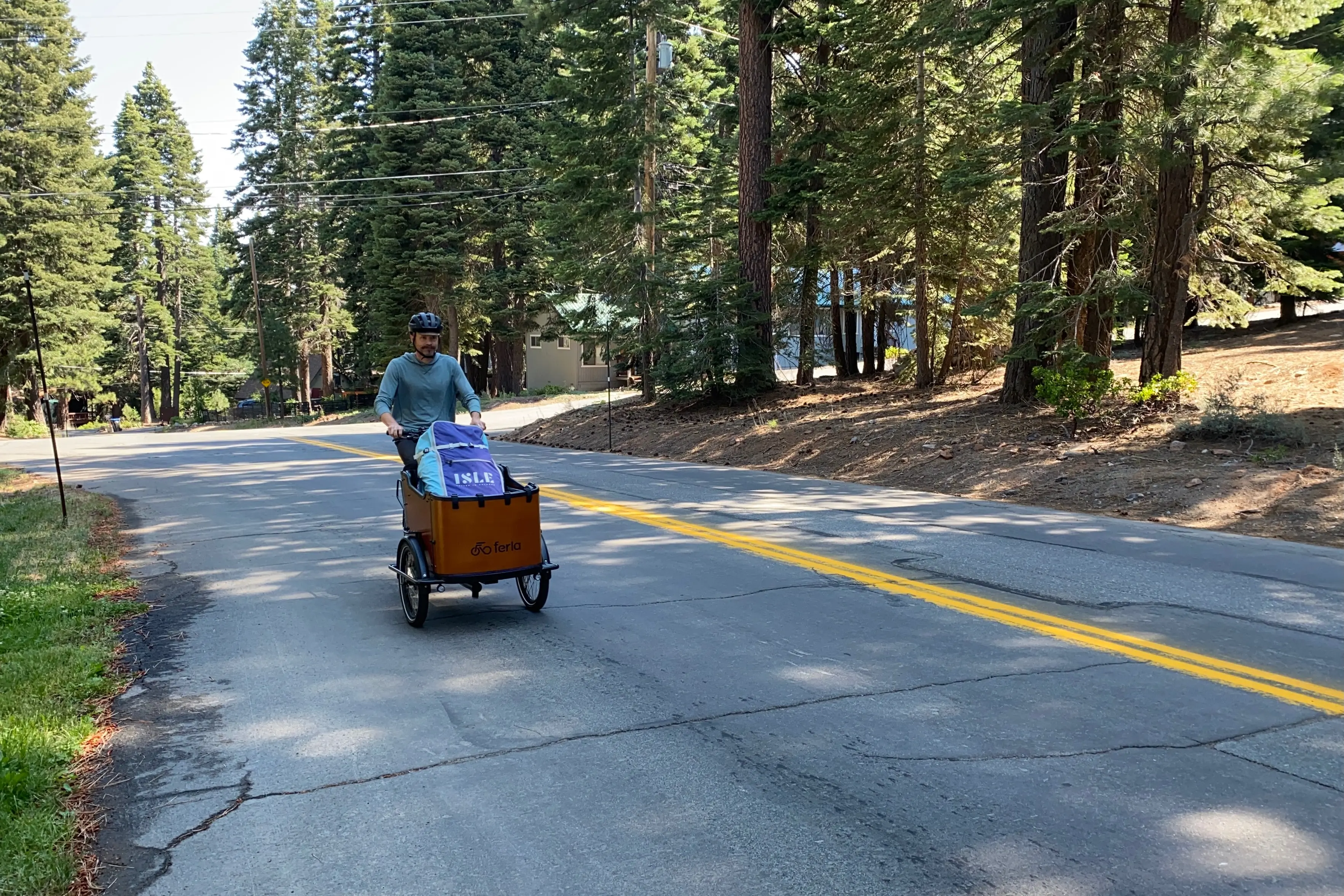



One thing the Royce 2 has going for it is the powerful 750W motor. Again, given the three-wheeled handling, this isn’t the kind of bike that I want to rip around on at its top speed of 20 mph — although its powerful enough that you certainly can — but if you’re actually transporting hundreds of pounds of cargo, you need some power to back that up.
I never came close to the 450-pound weight limit of the cargo box — and I doubt most people ever will — but I did ride around with my wife up front to simulate the weight of a couple of children. I also used it to transport my inflatable paddleboard down to the lake by my house.
With my 165 pounds and 125 pounds of weight in the front, the Royce 2 had plenty of power for cruising around and the motor had no problem making the small hills in my neighborhood basically disappear. Additionally, moving bulky items like a huge paddleboard was way easier than trying to strap it to the back of my long-tail cargo bike — just toss it in the front box and go.
Using pedal assistance or the throttle, there was plenty of oomph, and it definitely never felt underpowered. In fact, I found 15 mph to be about the top speed that I felt comfortable riding, so I barely ever even went above pedal assist level 3. That said, if I was carrying more weight in the front box, I’m sure I’d be pretty happy to have even more power on tap.
My test bike came with the single battery, which Ferla claims can last for up to 45 miles. I never did a specific range test, so I can’t confirm if that’s possible. To be honest, even half of that is probably plenty for the intended user group of a bike like this.
I’m not trying to ride this or any three-wheeled bike for 45 miles in a day. It’s more ideal for shorter trips around the neighborhood, to the beach, park, farmer’s market, or dropping the kids off at preschool than riding for long distances.
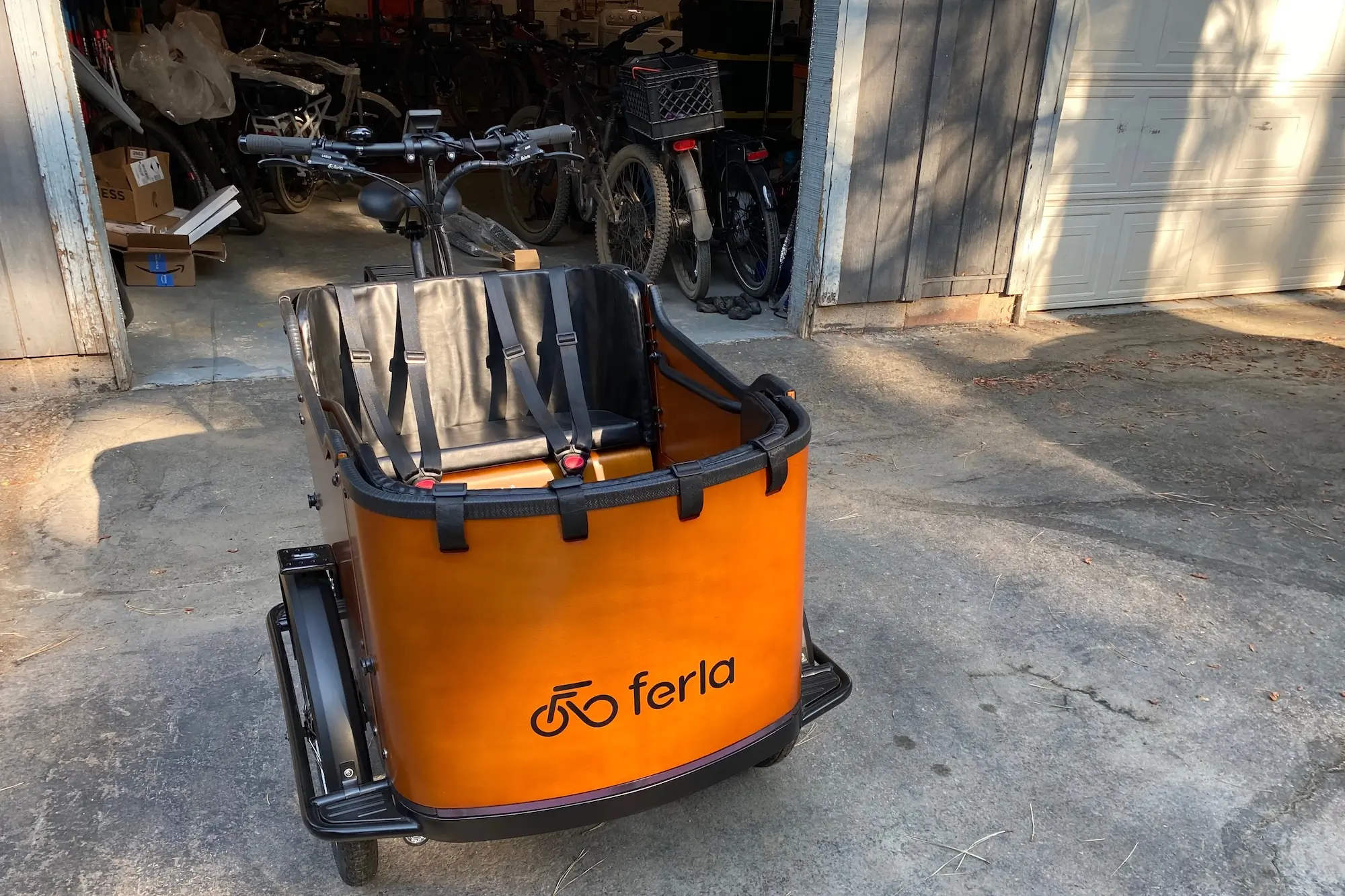



Storage
One of the biggest challenges with electric cargo bikes, and front box models in particular, is that they are pretty big and very heavy. The Ferla Royce 2 weighs a claimed 158 pounds, which I was unable to confirm since I don’t have a scale large enough to weigh it.
Regardless, this essentially means that once you’ve received the bike, it’s not going anywhere that you can’t ride or roll it. Transporting this bike is basically out of the question without a trailer and a ramp or several strong people to lift it into the bed of a truck.
It is also quite large at 85.5” long, 33.5” wide, and 47” tall, easily double the width of other bikes. It doesn’t just tuck up against the wall in your garage and disappear when not in use. You need a pretty significant amount of space to store it, whether that’s in a garage, storage shed, or outdoors.
If you’re storing it outside, it’s probably best to do it in a covered space, and even then, springing for the optional dust cover is probably wise to protect your investment. That said, this bike can essentially replace a vehicle, and it takes up much less space than one of those. It also happens to be a lot less expensive to purchase and maintain than a second car.
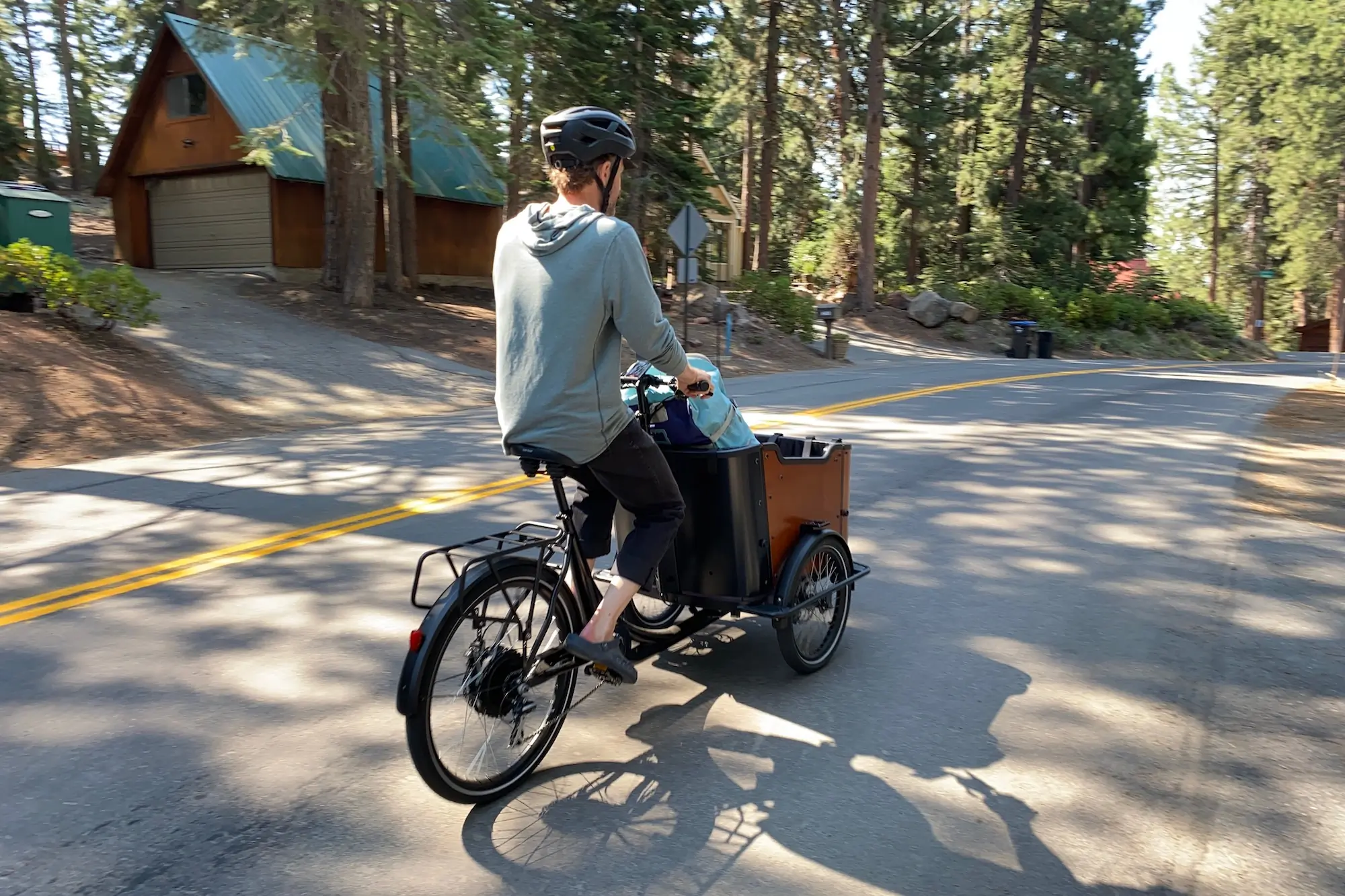



How Does It Compare?
I’ve tested plenty of electric cargo bikes in the past few years, but the Bunch Original is the only other three-wheeled front box model that I’ve tried. Since I tested the Bunch Original 2.0, however, it has been updated a couple of times — it is now called the Original 4+. Still, the two bikes are incredibly similar and feel nearly identical in terms of handling.
The Ferla Royce 2 and the Bunch Original look almost the same, but the Royce 2’s front box has a bit more of a refined look with curved edges. Ferla uses a more traditional handlebar design on the Royce 2 compared to the curved bar on the Bunch Original. Both honestly work just fine, but as a cyclist, I’m partial to the more “normal” look and shape of the handlebar on the Royce 2.
With a 750W rear hub motor, the Royce 2 also beats the Bunch Original 4+’s 500W motor in terms of power. How much weight you plan to carry and how hilly it is in your area will dictate how much power you actually need.
In terms of weight capacity, Ferla claims up to 450 pounds in the cargo box and 700 pounds total, which is probably more than pretty much anyone will ever try to transport by bike. Bunch claims the Original 4+ can handle a total capacity of 350 pounds, with up to 220 pounds of that in the front box. While that may be significantly less than Ferla’s claimed limit, realistically, it’s probably plenty for most people.
Price-wise, the Ferla Royce 2 goes for $5,499, and the Bunch Original 4+ goes for $5,799. So, you can save $300 by going with the Ferla Royce 2, which also happens to have a higher weight limit and a more powerful motor. With either bike, you’re also likely to want to invest in some of the accessories to set it up for your needs.
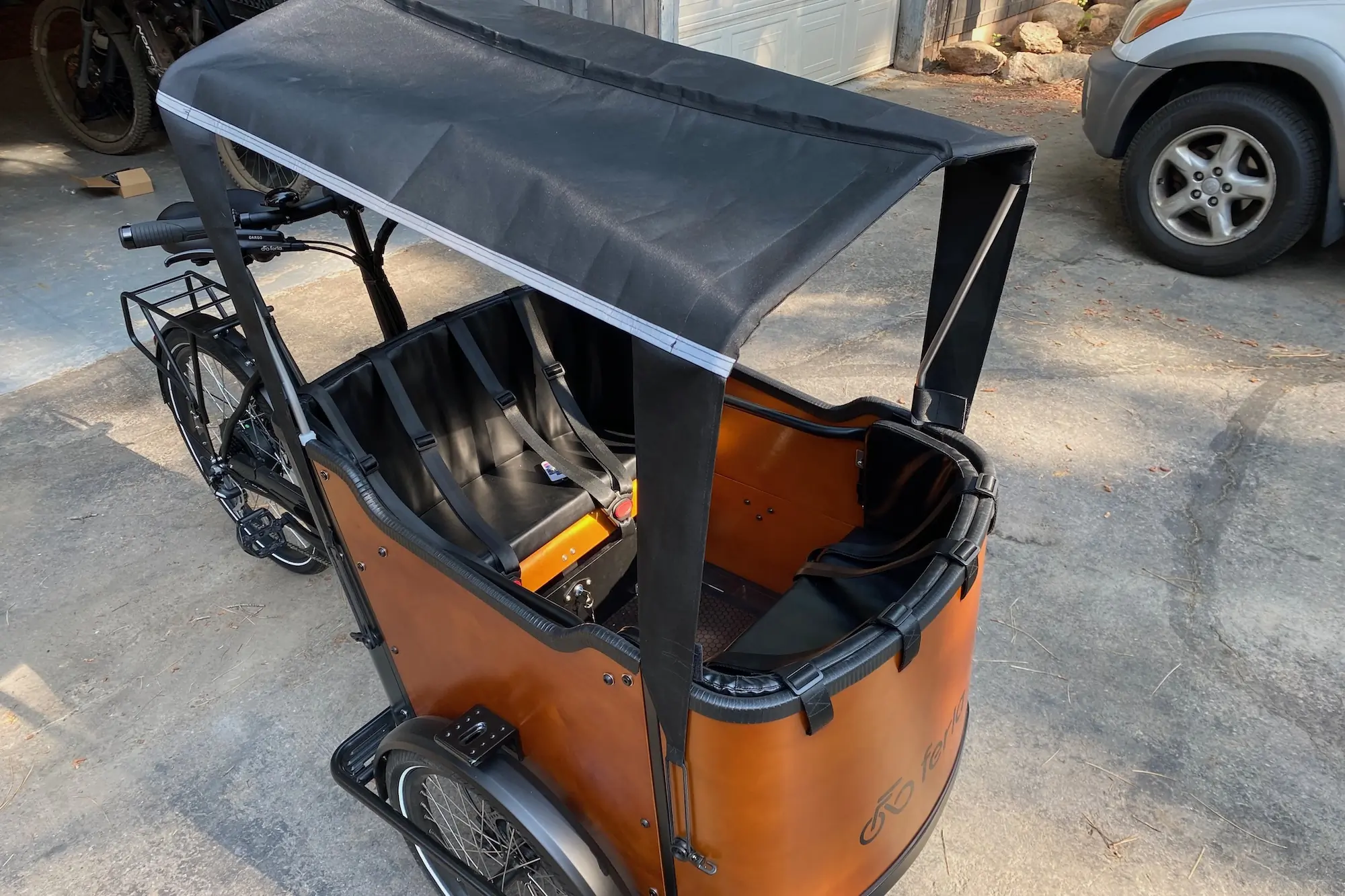



How about compared to long-tail cargo bikes? Most long-tail models top out at around 400-450 pounds for total weight capacity and can usually only fit a max of two child passengers on the back. Additionally, those passengers are behind the rider, where you can’t see them, and the weight can play a role in the bike’s balance.
The Royce 2 can handle up to 450 pounds of cargo alone and as many as four child passengers. They are situated in the front where the rider can see them, and the weight doesn’t negatively impact the bike’s balance.
Two-wheeled long-tail cargo bikes have the upper hand in terms of handling, which feels more natural and comfortable at higher speeds. They are also more easily maneuverable and don’t require as much caution while turning — although, obviously, you should still be cautious if/when riding with child passengers.
There’s also the price to consider. Budget-friendly long-tail cargo bikes start at around $1,800 but can also climb up into the $5,000+ range.
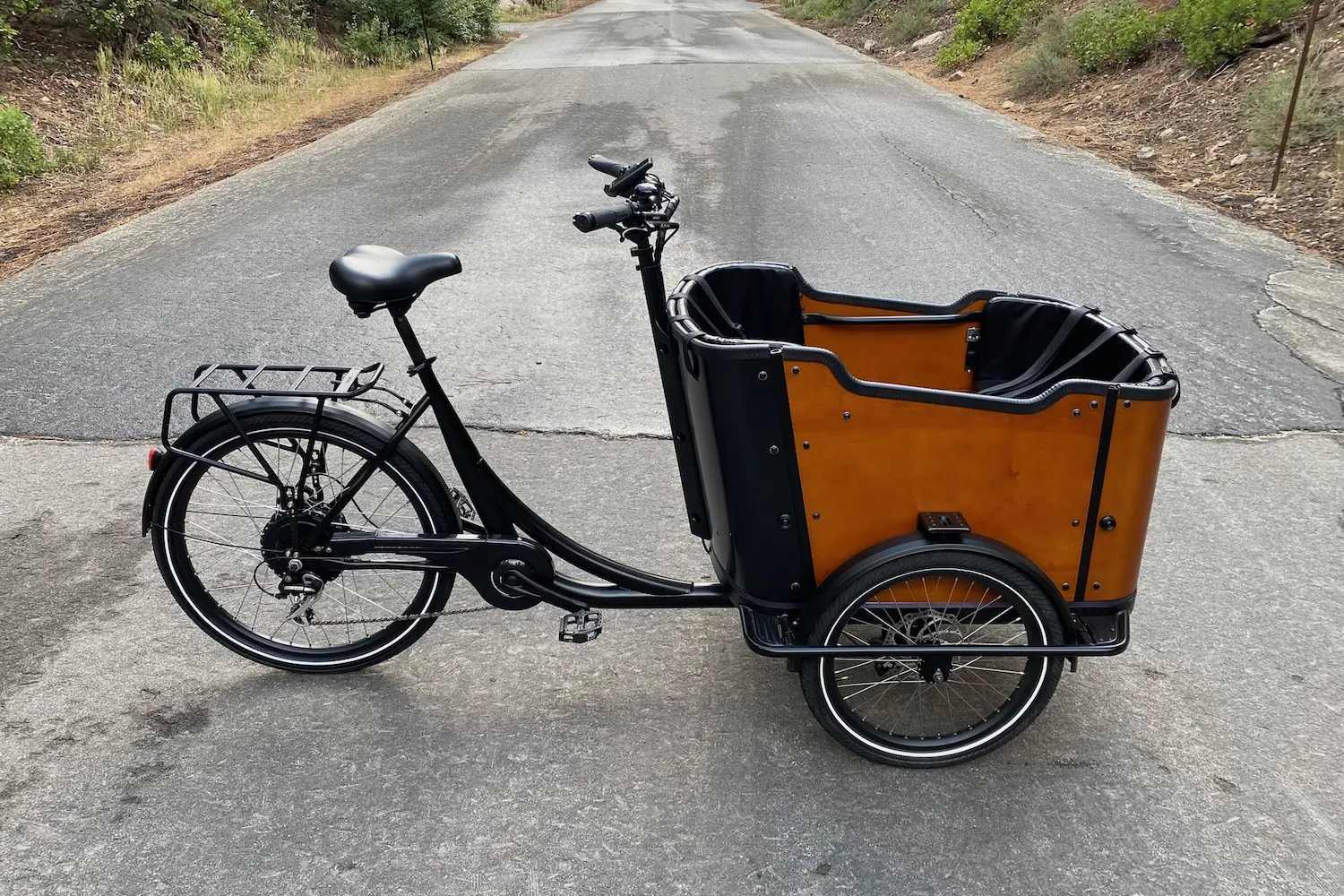



Conclusion
Electric cargo bikes are often touted as vehicle replacements, but few can actually do it. The Ferla Royce 2, however, truly seems up to the task. With a spacious cargo box, an incredibly high weight limit, the ability to carry up to four kids at a time — as many as most cars — and a powerful motor that can handle it, this bike exceeds the hauling capabilities of any other bike I’ve ridden or seen.
The finish quality is impeccable, it looks fantastic, and the cargo compartment can be configured for maximum comfort, weather protection, and enjoyment of the passengers. Perhaps best of all, the cargo box puts passengers in the front where the rider can see and interact with them on the go.
It’s not cheap, and the handling takes some getting used to, but the same is true for any other bike of this style. Conservative speeds and cautious riding are the name of the game, which is in line with its intended use. Still, if you’re seeking a family-friendly transportation solution that allows you to enjoy more time outside with your kids, the Ferla Royce 2 might be just the thing you’re looking for.
